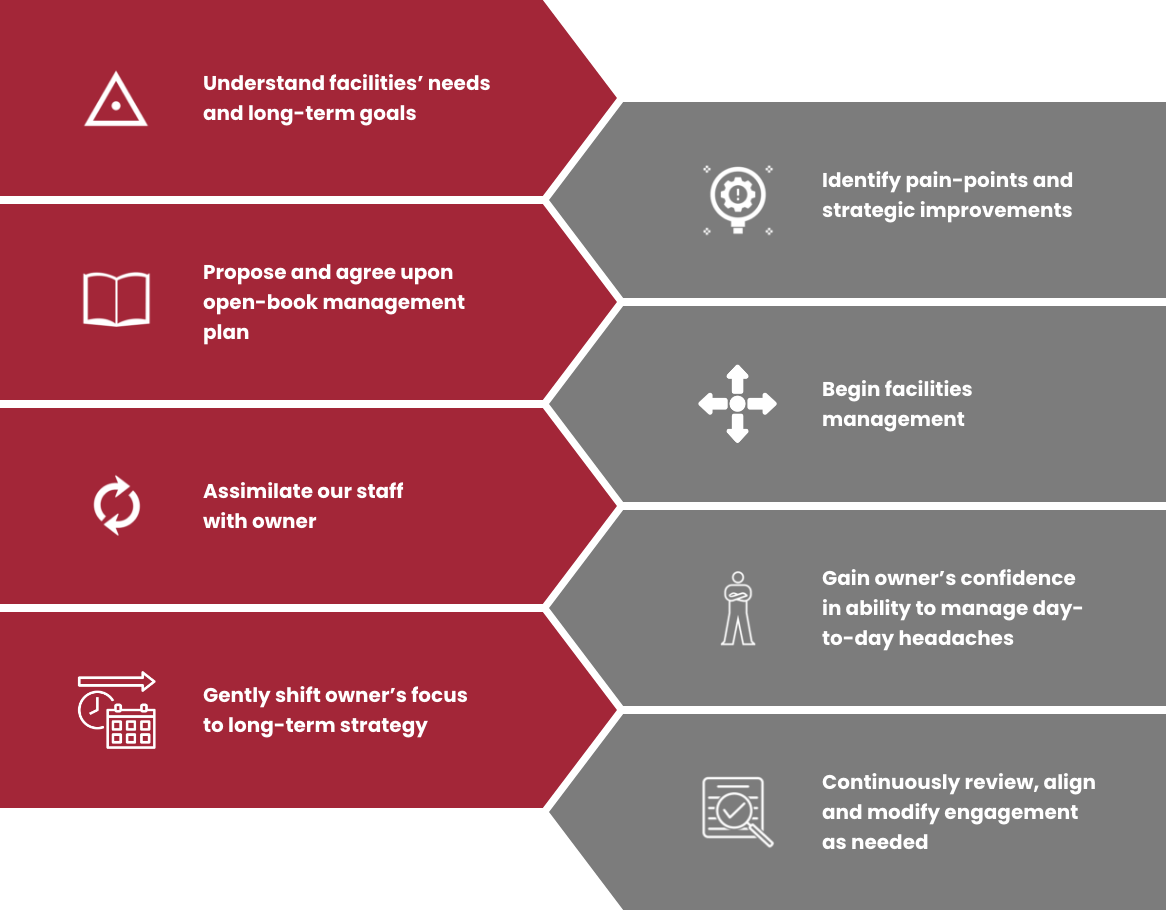Key Trends Forming the Future of Center Administration in 2024
As we look ahead to 2024, the landscape of facility administration is poised for significant change, driven by a number of key fads. The assimilation of wise building innovations and a change in the direction of data-driven decision-making promise to enhance functional efficiency while prioritizing sustainability in method.
Smart Structure Technologies

Smart building modern technologies include a vast range of systems, including intelligent lighting, heating and cooling controls, and safety and security systems. By integrating these systems, facility supervisors can keep an eye on and adjust criteria in real-time, bring about substantial decreases in energy waste and operational costs. Clever sensing units can detect occupancy levels and adjust lighting and temperature level accordingly, making certain that power is just utilized when required.
Moreover, these technologies promote boosted information collection, enabling companies to track usage patterns and recognize possibilities for additional enhancements. The execution of wise structure technologies not just adds to sustainability goals yet additionally develops healthier work environments that can improve worker productivity and complete satisfaction.
As we relocate right into 2024, the adoption of clever building technologies will likely accelerate, reflecting a broader shift in the direction of more smart, responsive, and lasting facility monitoring techniques.
Data-Driven Choice Making
Progressively, companies are leveraging data-driven choice making to enhance facility management techniques. By harnessing information analytics, facility supervisors can obtain actionable understandings that significantly boost functional efficiency and resource appropriation. The assimilation of sophisticated technologies, such as IoT sensing units and real-time tracking systems, allows the collection of substantial amounts of data on structure performance, occupancy prices, and energy usage.
This wide range of details permits facility managers to determine fads, anticipate upkeep requirements, and proactively address problems before they rise. For example, anticipating analytics can forecast devices failings, lowering downtime and fixing prices. In addition, information visualization tools assist in better interaction among stakeholders, ensuring that educated choices are made collaboratively.
Moreover, data-driven strategies enhance calculated planning by allowing facility managers to analyze the performance of existing methods and make educated selections relating to investments in technology or infrastructure. As companies increasingly prioritize functional excellence, data-driven decision making is poised to end up being a foundation of effective facility administration strategies in 2024 and beyond. Ultimately, the ability to take advantage of information successfully will encourage organizations to produce a lot more efficient, efficient, and durable facilities.
Sustainability and Green Practices
The emphasis on data-driven decision making naturally aligns with the growing concentrate on sustainability and green practices within facility monitoring. As companies progressively prioritize environmental responsibility, center supervisors are leveraging analytics to optimize source usage, decrease waste, and decrease carbon impacts. This critical technique allows the integration of energy-efficient systems, such as LED lighting, wise a/c controls, and Click Here renewable resource sources into facility procedures.
Furthermore, the execution of lasting practices prolongs past energy usage. Facility managers are promoting and adopting green products reusing efforts to develop a circular economy within their facilities. This not just enhances the ecological account of the organization however additionally fosters a society of sustainability amongst workers.
Compliance with ecological policies is an additional vital element driving the fostering of environment-friendly practices. By making use of data analytics, facility supervisors can keep an eye on compliance metrics and identify areas for renovation, making sure adherence to international and local sustainability criteria.
Crossbreed Work Versions
A substantial change towards hybrid job models is reshaping the landscape of center administration in 2024. This paradigm combines remote and in-office job, necessitating a reevaluation of area utilization, resource appropriation, and staff member engagement strategies. Organizations are progressively acknowledging the value of adaptable work spaces that provide to varied demands and choices.
Center managers need to adapt by carrying out versatile workplace layouts that support joint efforts while supplying locations for focused job. This consists of the combination of modern technology to assist in smooth communication and collaboration among in-office and remote staff members. Smart structure remedies, outfitted with sensors and analytics, allow for real-time tracking of area use, enabling organizations to maximize their environments effectively.
In addition, hybrid work designs stress the demand for effective facility administration that focuses on worker experience. This includes not just modern technology and room design but likewise the advancement of plans that advertise a well balanced work-life dynamic. As firms navigate this transition, the role of facility administration ends up being crucial in developing an agile workplace that fosters productivity and drives organizational success. In essence, the hybrid work design is reinventing center administration, motivating a positive technique to her latest blog fulfill the progressing needs of the labor force.
Improved Resident Health
As companies accept hybrid work versions, an enhanced emphasis on resident health is ending up being essential to facility administration techniques. Facility Management. This shift identifies that a pleased and healthy labor force directly impacts performance and retention prices. Facility supervisors are currently prioritizing settings that promote physical and psychological well-being, incorporating aspects such as all-natural illumination, biophilic design, and obtainable wellness resources

Technology plays an essential role in this evolution. Smart building systems can monitor ecological variables and readjust setups in real-time, making sure ideal comfort levels - Facility Management. Furthermore, feedback devices, such as tenancy sensing units and worker surveys, permit center managers to constantly refine wellness campaigns based upon passenger requirements.

Conclusion
In 2024, the future of center management will be considerably influenced by the combination of wise building technologies and data-driven decision-making, fostering enhanced operational effectiveness. These fads jointly highlight the advancing landscape of center administration in feedback to modern difficulties and possibilities.
Center managers are promoting and taking on green products recycling efforts to produce a circular economic climate within their centers.A significant change in the direction of hybrid work designs is reshaping the landscape of center administration in 2024.Additionally, crossbreed work models stress the requirement for reliable center management that focuses on employee experience.As companies accept hybrid work designs, an enhanced focus on owner wellness is becoming essential to facility administration methods.In 2024, the future of center administration will certainly be dramatically affected by the combination of wise building modern technologies and data-driven decision-making, fostering improved functional effectiveness.